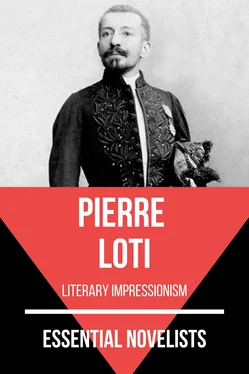Suddenly I hear some one tapping three times, with a harsh and bony finger, against one of the steps of our stairs, and in our doorway appears an idiot, clad in a suit of gray tweed, who bows low. “Come in, come in, Monsieur Kangourou. You come just in the nick of time! I was actually becoming enthusiastic over your country!”
M. Kangourou brought a little laundry bill, which he wished respectfully to hand to me, with a profound bend of the whole body, the correct pose of the hands on the knees, and a long, snake-like hiss.
CHAPTER XXI. ANCIENT TOMBS
––––––––
PURSUING THE PATH THAT winds past our, dwelling, one passes a dozen or more old villas, a few garden-walls, and then sees nothing but the lonely mountain-side, with little paths winding upward toward the summit through plantations of tea, bushes of camellias, underbrush, and rocks. The mountains round Nagasaki are covered with cemeteries; for centuries and centuries they have brought their dead up here.
But there is neither sadness nor horror in these Japanese sepulchres; it seems as if, among this frivolous and childish people, death itself could not be taken seriously. The monuments are either granite Buddhas, seated on lotus, or upright tombstones with inscriptions in gold. They are grouped together in little enclosures in the midst of the woods, or on natural terraces delightfully situated, and are usually reached by long stairways of stone carpeted with moss. Sometimes these pass under one of the sacred gateways, of which the shape, always the same, rude and simple, is a smaller reproduction of those in the temples.
Above us, the tombs of our mountain are of an antiquity so hoary that they no longer alarm any one, even at night. It is a region of forsaken cemeteries. The dead hidden away there have long since become one with the earth around them; and these thousands of little gray stones, these multitudes of ancient little Buddhas, eaten away by lichens, seem to be now no more than a proof of a series of existences, long anterior to our own, and lost forever and altogether in the mysterious depths of ages.
CHAPTER XXII. DAINTY DISHES FOR A DOLL
––––––––
THE MEALS THAT CHRYSANTHEME enjoys are something almost indescribable.
She begins in the morning, when she wakes, with two little green wild plums pickled in vinegar and rolled in powdered sugar. A cup of tea completes this almost traditional breakfast of Japan, the very same that Madame Prune is eating downstairs, the same that is served in the inns to travellers.
At intervals during the day the meals are continued by two little dinners of the drollest description. They are brought up on a tray of red lacquer, in microscopic cups with covers, from Madame Prune’s apartment, where they are cooked: a hashed sparrow, a stuffed prawn, seaweed with a sauce, a salted sweetmeat, a sugared chili! Chrysantheme tastes a little of all, with dainty pecks and the aid of her little chopsticks, raising the tips of her fingers with affected grace. At every dish she makes a face, leaves three parts of it, and dries her finger-tips after it in apparent disgust.
These menus vary according to the inspiration that may have seized Madame Prune. But one thing never varies, either in our household or in any other, neither in the north nor in the south of the Empire, and that is the dessert and the manner of eating it: after all these little dishes, which are a mere make-believe, a wooden bowl is brought in, bound with copper—an enormous bowl, fit for Gargantua, and filled to the very brim with rice, plainly cooked in water. Chrysantheme fills another large bowl from it (sometimes twice, sometimes three times), darkens its snowy whiteness with a black sauce flavored with fish, which is contained in a delicately shaped blue cruet, mixes it all together, carries the bowl to her lips, and crams down all the rice, shovelling it with her two chop-sticks into her very throat. Next the little cups and covers are picked up, as well as the tiniest crumb that may have fallen upon the white mats, the irreproachable purity of which nothing is allowed to tarnish. And so ends the dinner.
CHAPTER XXIII. A FANTASTIC FUNERAL
––––––––

BELOW, IN THE TOWN, a street-singer had established herself in a little thoroughfare; people had gathered around her to listen to her singing, and we three—that is, Yves, Chrysantheme, and I—who happened to be passing, stopped also.
She was quite young, rather fat, and fairly pretty, and she strummed her guitar and sang, rolling her eyes fiercely, like a virtuoso executing feats of difficulty. She lowered her head, stuck her chin into her neck, in order to draw deeper notes from the furthermost recesses of her body; and succeeded in bringing forth a great, hoarse voice—a voice that might have belonged to an aged frog, a ventriloquist’s voice, coming whence it would be impossible to say (this is the best stage manner, the last touch of art, in the interpretation of tragic pieces).
Yves cast an indignant glance upon her.
“Good gracious,” said he, “she has the voice of a——” (words failed him, in his astonishment) “the voice of a—a monster!”
And he looked at me, almost frightened by this little being, and desirous to know what I thought of it.
Yves was out of temper on this occasion, because I had induced him to come out in a straw hat with a turned-up brim, which did not please him.
“That hat suits you remarkably well, Yves, I assure you,” I said.
“Oh, indeed! You say so, you. For my part, I think it looks like a magpie’s nest!”
As a fortunate diversion from the singer and the hat, here comes a cortege, advancing toward us from the end of the street, something remarkably like a funeral. Bonzes march in front, dressed in robes of black gauze, having much the appearance of Catholic priests; the principal object of interest of the procession, the corpse, comes last, laid in a sort of little closed palanquin, which is daintily pretty. This is followed by a band of mousmes, hiding their laughing faces beneath a kind of veil, and carrying in vases of the sacred shape the artificial lotus with silver petals indispensable at a funeral; then come fine ladies, on foot, smirking and stifling a wish to laugh, beneath parasols on which are painted, in the gayest colors, butterflies and storks.
Now they are quite close to us, we must stand back to give them room. Chrysantheme all at once assumes a suitable air of gravity, and Yves bares his head, taking off the magpie’s nest.
Yes, it is true, it is death that is passing!
I had almost lost sight of the fact, so little does this procession recall it.
The procession will climb high above Nagasaki, into the heart of the green mountain covered with tombs. There the poor fellow will be laid at rest, with his palanquin above him, and his vases and his flowers of silvered paper. Well, at least he will lie in a charming spot commanding a lovely view.
Then they will return half laughing, half snivelling, and tomorrow no one will think of it again.
CHAPTER XXIV. SOCIABILITY
––––––––
AUGUST 4TH.
Our ship, the ‘Triomphante’, which has been lying in the harbor almost at the foot of the hill on which stands my house, enters the dock to-day to undergo repairs rendered necessary by the long blockade of Formosa.
I am now a long way from my home, and am compelled to cross by boat the whole breadth of the bay when I wish to see Chrysantheme; for the dock is situated on the shore, opposite to Diou-djen-dji. It is sunk in a little valley, narrow and deep, midst all kinds of foliage—bamboos, camellias, trees of all sorts; our masts and spars, seen from the deck, look as if they were tangled among the branches.
Читать дальше













